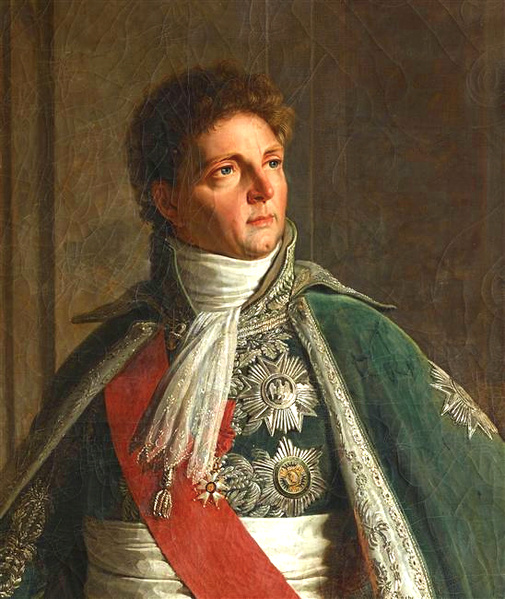<Back to Index>
- Physicist Ludwig Eduard Boltzmann, 1844
- Architect Ernst Carl Westman, 1866
- Marshal of France Louis Alexandre Berthier, 1753
Louis Alexandre Berthier, 1st Duc de Wagram, 1st Duc de Valengin, 1st Sovereign Prince de Neuchâtel (February 20, 1753 Versailles – June 1, 1815 Bamberg), marshal of France, Vice-Constable of France beginning in 1808, and Chief of Staff under Napoleon. Alexandre was born at Versailles to Lieutenant-Colonel Jean
Baptiste Berthier (1721 – 1804), an officer in the Corps of
Topographical Engineers, and first wife (married in 1746) Marie
Françoise L'Huillier de La Serre. He was the oldest of five
children, with the three brothers also serving in the French Army, two
becoming generals during the Napoleonic Wars. As a boy he was instructed in the military art by his father, an officer of the Corps de genie (Engineer
Corps), and at the age of seventeen he entered the army, serving
successively in the staff, the engineers and the prince de Lambesq's
dragoons. In 1780 he went to North America with Rochambeau,
and on his return, having attained the rank of colonel, he was employed
in various staff posts and in a military mission to Prussia. During the Revolution, as Chief of Staff of the Versailles National Guard, he protected the aunts of Louis XVI from popular violence, and aided their escape (1791). In
the war of 1792 he was at once made Chief of Staff to Marshal
Lückner, and he bore a distinguished part in the Argonne campaign of Dumouriez and Kellermann.
He served with great credit in the Vendéan War of 1793-95, and
was in the next year made a general of division and chief of staff
(Major-Général) to the army of Italy,
which Bonaparte had recently been appointed to command. His power of
work, accuracy and quick comprehension, combined with his long and
varied experience and his complete mastery of detail, made him the
ideal chief of staff to a great soldier; and in this capacity he was
Napoleon's most valued assistant for the rest of his career. He accompanied Napoleon throughout the brilliant campaign of 1796, and was left in charge of the army after the Treaty of Campo Formio. He was in this post in 1798 when he entered Italy, invaded the Vatican, organized the Roman republic, and took the pope Pius VI as
prisoner back to Valence (France) where, after a journey of torturous
suffering, the pope, a helpless prisoner under Berthier's supervision,
died, dealing a major blow to the Vatican's political power which,
however did not prove as ephemeral as that of the First Empire. After
this he joined his chief in Egypt, serving there until Napoleon's return. He assisted in the coup d'état of 18th Brumaire, afterwards becoming minister of war for a time. In the campaign of Marengo he
was the nominal head of the Army of Reserve, but the first consul
accompanied the army and Berthier acted in reality, as always, as Chief
of Staff to Napoleon. At the close of the campaign he was employed in
civil and diplomatic business. This included a mission to Spain in
August, 1800, which resulted in the retrocession of Louisiana to France by the Treaty of San Ildefonso, October 1, 1800, and led to the Louisiana Purchase. When
Napoleon became emperor, Berthier was at once made a marshal of the
empire. He took part in the campaigns of Austerlitz, Jena and
Friedland, and was created duke of Valengin in 1806, sovereign prince
of Neuchâtel in the same year and vice-constable of the empire in
1807. In 1808 he married on March 9 Maria Elisabeth Franziska of Bavaria (Landshut, 5 May 1784 –Paris, 1 June 1849), a distant cousin by a collateral branch of the King of Bavaria, and served in the Peninsula, and in 1809 in the Austrian War, after which he was given the title of prince of Wagram.
He was with Napoleon in Russia in 1812, Germany in 1813, and France in
1814, fulfilling, till the fall of the empire, the functions of
"major-general" of the Grande Armée. Following Napoleon's first abdication, Berthier retired to his 600 acre (2.4 km²) estate, and resumed his hobbies of falconry and sculpture. He made peace with Louis XVIII in 1814, and accompanied the king in his solemn entry into Paris. During Napoleon's captivity in Elba,
Berthier, whom he informed of his projects, was much perplexed as to
his future course, and, being unwilling to commit him, fell under the
suspicion both of his old leader and of Louis XVIII. On Napoleon's
return he withdrew to Bamberg, where he later died. Berthier was not a great
commander. When he was in temporary command in 1809, the French army in Bavaria underwent
a series of reverses. Whatever merit as a general he may have possessed
was completely overshadowed by the genius of his emperor, be he is nevertheless renowned for being able to understand and carry out the emperor's directions to the minutest detail.
